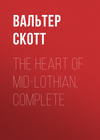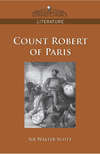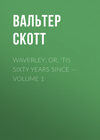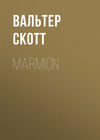Read the book: «The Pirate», page 11
“Ay, ay, brother,” said his sister, “that’s spoken like your wise sell. The mair cost the mair honour – that’s your word ever mair. Can it no creep into your wise head, man, that ilka body grinds their ain nievefu’ of meal in this country, without plaguing themsells about barons’ mills, and thirls, and sucken, and the like trade? How mony a time have I heard you bell-the-cat with auld Edie Netherstane, the miller at Grindleburn, and wi’ his very knave too, about in-town and out-town multures – lock, gowpen, and knaveship, and a’ the lave o’t; and now naething less will serve you than to bring in the very same fashery on a wheen puir bodies, that big ilk ane a mill for themselves, sic as it is?”
“Dinna tell me of gowpen and knaveship!” exclaimed the indignant agriculturist; “better pay the half of the grist to the miller, to have the rest grund in a Christian manner, than put good grain into a bairn’s whirligig. Look at it for a moment, Baby – Bide still, ye cursed imp!” This interjection was applied to his pony, which began to be extremely impatient, while its rider interrupted his journey, to point out all the weak points of the Zetland mill – “Look at it, I say – it’s just one degree better than a hand-quern – it has neither wheel nor trindle – neither cog nor happer – Bide still, there’s a canny beast – it canna grind a bickerfu’ of meal in a quarter of an hour, and that will be mair like a mash for horse than a meltith for man’s use – Wherefore – Bide still, I say – wherefore – wherefore – The deil’s in the beast, and nae good, I think!”
As he uttered the last words, the shelty, which had pranced and curvetted for some time with much impatience, at length got its head betwixt its legs, and at once canted its rider into the little rivulet, which served to drive the depreciated engine he was surveying; then emancipating itself from the folds of the cloak, fled back towards its own wilderness, neighing in scorn, and flinging out its heels at every five yards.
Laughing heartily at his disaster, Mordaunt helped the old man to arise; while his sister sarcastically congratulated him on having fallen rather into the shallows of a Zetland rivulet than the depths of a Scottish mill-pond. Disdaining to reply to this sarcasm, Triptolemus, so soon as he had recovered his legs, shaken his ears, and found that the folds of his cloak had saved him from being much wet in the scanty streamlet, exclaimed aloud, “I will have cussers from Lanarkshire – brood mares from Ayrshire – I will not have one of these cursed abortions left on the islands, to break honest folk’s necks – I say, Baby, I will rid the land of them.”
“Ye had better wring your ain cloak, Triptolemus,” answered Baby.
Mordaunt meanwhile was employed in catching another pony, from a herd which strayed at some distance; and, having made a halter out of twisted rushes, he seated the dismayed agriculturist in safety upon a more quiet, though less active steed, than that which he had at first bestrode.
But Mr. Yellowley’s fall had operated as a considerable sedative upon his spirits, and, for the full space of five miles’ travel, he said scarce a word, leaving full course to the melancholy aspirations and lamentations which his sister Baby bestowed on the old bridle, which the pony had carried off in its flight, and which, she observed, after having lasted for eighteen years come Martinmas, might now be considered as a castaway thing. Finding she had thus the field to herself, the old lady launched forth into a lecture upon economy, according to her own idea of that virtue, which seemed to include a system of privations, which, though observed with the sole purpose of saving money, might, if undertaken upon other principles, have ranked high in the history of a religious ascetic.
She was but little interrupted by Mordaunt, who, conscious he was now on the eve of approaching Burgh-Westra, employed himself rather in the task of anticipating the nature of the reception he was about to meet with there from two beautiful young women, than with the prosing of an old one, however wisely she might prove that small-beer was more wholesome than strong ale, and that if her brother had bruised his ankle bone in his tumble, cumfrey and butter was better to bring him round again, than all the doctor’s drugs in the world.
But now the dreary moorlands, over which their path had hitherto lain, were exchanged for a more pleasant prospect, opening on a salt-water lake, or arm of the sea, which ran up far inland, and was surrounded by flat and fertile ground, producing crops better than the experienced eye of Triptolemus Yellowley had as yet witnessed in Zetland. In the midst of this Goshen stood the mansion of Burgh-Westra, screened from the north and east by a ridge of heathy hills which lay behind it, and commanding an interesting prospect of the lake and its parent ocean, as well as the islands, and more distant mountains. From the mansion itself, as well as from almost every cottage in the adjacent hamlet, arose such a rich cloud of vapoury smoke, as showed, that the preparations for the festival were not confined to the principal residence of Magnus himself, but extended through the whole vicinage.
“My certie,” said Mrs. Baby Yellowley, “ane wad think the haill town was on fire! The very hill-side smells of their wastefulness, and a hungry heart wad scarce seek better kitchen34 to a barley scone, than just to waft it in the reek that’s rising out of yon lums.”
CHAPTER XII
– Thou hast described
A hot friend cooling. Ever note, Lucilius,
When love begins to sicken and decay,
It useth an enforced ceremony.
There are no tricks in plain and simple faith.
Julius Cæsar.
If the smell which was wafted from the chimneys of Burgh-Westra up to the barren hills by which the mansion was surrounded, could, as Mistress Barbara opined, have refreshed the hungry, the noise which proceeded from thence might have given hearing to the deaf. It was a medley of all sounds, and all connected with jollity and kind welcome. Nor were the sights associated with them less animating.
Troops of friends were seen in the act of arriving – their dispersed ponies flying to the moors in every direction, to recover their own pastures in the best way they could; – such, as we have already said, being the usual mode of discharging the cavalry which had been levied for a day’s service. At a small but commodious harbour, connected with the house and hamlet, those visitors were landing from their boats, who, living in distant islands, and along the coast, had preferred making their journey by sea. Mordaunt and his companions might see each party pausing frequently to greet each other, and strolling on successively to the house, whose ever open gate received them alternately in such numbers, that it seemed the extent of the mansion, though suited to the opulence and hospitality of the owner, was scarce, on this occasion, sufficient for the guests.
Among the confused sounds of mirth and welcome which arose at the entrance of each new company, Mordaunt thought he could distinguish the loud laugh and hearty salutation of the Sire of the mansion, and began to feel more deeply than before, the anxious doubt, whether that cordial reception, which was distributed so freely to all others, would be on this occasion extended to him. As they came on, they heard the voluntary scrapings and bravura effusions of the gallant fiddlers, who impatiently flung already from their bows those sounds with which they were to animate the evening. The clamour of the cook’s assistants, and the loud scolding tones of the cook himself, were also to be heard – sounds of dissonance at any other time, but which, subdued with others, and by certain happy associations, form no disagreeable part of the full chorus which always precedes a rural feast.
Meanwhile, the guests advanced, each full of their own thoughts. Mordaunt’s we have already noticed. Baby was wrapt up in the melancholy grief and surprise excited by the positive conviction, that so much victuals had been cooked at once as were necessary to feed all the mouths which were clamouring around her – an enormity of expense, which, though she was no way concerned in bearing it, affected her nerves, as the beholding a massacre would touch those of the most indifferent spectator, however well assured of his own personal safety. She sickened, in short, at the sight of so much extravagance, like Abyssinian Bruce, when he saw the luckless minstrels of Gondar hacked to pieces by the order of Ras Michael. As for her brother, they being now arrived where the rude and antique instruments of Zetland agriculture lay scattered in the usual confusion of a Scottish barn-yard, his thoughts were at once engrossed in the deficiencies of the one-stilted plough – of the twiscar, with which they dig peats – of the sledges, on which they transport commodities – of all and every thing, in short, in which the usages of the islands differed from those of the mainland of Scotland. The sight of these imperfect instruments stirred the blood of Triptolemus Yellowley, as that of the bold warrior rises at seeing the arms and insignia of the enemy he is about to combat; and, faithful to his high emprise, he thought less of the hunger which his journey had occasioned, although about to be satisfied by such a dinner as rarely fell to his lot, than upon the task which he had undertaken, of civilizing the manners, and improving the cultivation, of Zetland.
“Jacta est alea,” he muttered to himself; “this very day shall prove whether the Zetlanders are worthy of our labours, or whether their minds are as incapable of cultivation as their peat-mosses. Yet let us be cautious, and watch the soft time of speech. I feel, by my own experience, that it were best to let the body, in its present state, take the place of the mind. A mouthful of that same roast-beef, which smells so delicately, will form an apt introduction to my grand plan for improving the breed of stock.”
By this time the visitors had reached the low but ample front of Magnus Troil’s residence, which seemed of various dates, with large and ill-imagined additions, hastily adapted to the original building, as the increasing estate, or enlarged family, of successive proprietors, appeared to each to demand. Beneath a low, broad, and large porch, supported by two huge carved posts, once the head-ornaments of vessels which had found shipwreck upon the coast, stood Magnus himself, intent on the hospitable toil of receiving and welcoming the numerous guests who successively approached. His strong portly figure was well adapted to the dress which he wore – a blue coat of an antique cut, lined with scarlet, and laced and looped with gold down the seams and button-holes, and along the ample cuffs. Strong and masculine features, rendered ruddy and brown by frequent exposure to severe weather – a quantity of most venerable silver hair, which fell in unshorn profusion from under his gold-laced hat, and was carelessly tied with a ribbon behind, expressed at once his advanced age, his hasty, yet well-conditioned temper, and his robust constitution. As our travellers approached him, a shade of displeasure seemed to cross his brow, and to interrupt for an instant the honest and hearty burst of hilarity with which he had been in the act of greeting all prior arrivals. When he approached Triptolemus Yellowley, he drew himself up, so as to mix, as it were, some share of the stately importance of the opulent Udaller with the welcome afforded by the frank and hospitable landlord.
“You are welcome, Mr. Yellowley,” was his address to the factor; “you are welcome to Westra – the wind has blown you on a rough coast, and we that are the natives must be kind to you as we can. This, I believe, is your sister – Mistress Barbara Yellowley, permit me the honour of a neighbourly salute.” – And so saying, with a daring and self-devoted courtesy, which would find no equal in our degenerate days, he actually ventured to salute the withered cheek of the spinster, who relaxed so much of her usual peevishness of expression, as to receive the courtesy with something which approached to a smile. He then looked full at Mordaunt Mertoun, and without offering his hand, said, in a tone somewhat broken by suppressed agitation, “You too are welcome, Master Mordaunt.”
“Did I not think so,” said Mordaunt, naturally offended by the coldness of his host’s manner, “I had not been here – and it is not yet too late to turn back.”
“Young man,” replied Magnus, “you know better than most, that from these doors no man can turn, without an offence to their owner. I pray you, disturb not my guests by your ill-timed scruples. When Magnus Troil says welcome, all are welcome who are within hearing of his voice, and it is an indifferent loud one. – Walk on, my worthy guests, and let us see what cheer my lasses can make you within doors.”
So saying, and taking care to make his manner so general to the whole party, that Mordaunt should not be able to appropriate any particular portion of the welcome to himself, nor yet to complain of being excluded from all share in it, the Udaller ushered the guests into his house, where two large outer rooms, which, on the present occasion, served the purpose of a modern saloon, were already crowded with guests of every description.
The furniture was sufficiently simple, and had a character peculiar to the situation of those stormy islands. Magnus Troil was, indeed, like most of the higher class of Zetland proprietors, a friend to the distressed traveller, whether by sea or land, and had repeatedly exerted his whole authority in protecting the property and persons of shipwrecked mariners; yet so frequent were wrecks upon that tremendous coast, and so many unappropriated articles were constantly flung ashore, that the interior of the house bore sufficient witness to the ravages of the ocean, and to the exercise of those rights which the lawyers term Flotsome and Jetsome. The chairs, which were arranged around the walls, were such as are used in cabins, and many of them were of foreign construction; the mirrors and cabinets, which were placed against the walls for ornament or convenience, had, it was plain from their form, been constructed for ship-board, and one or two of the latter were of strange and unknown wood. Even the partition which separated the two apartments, seemed constructed out of the bulkhead of some large vessel, clumsily adapted to the service which it at present performed, by the labour of some native joiner. To a stranger, these evident marks and tokens of human misery might, at the first glance, form a contrast with the scene of mirth with which they were now associated; but the association was so familiar to the natives, that it did not for a moment interrupt the course of their glee.
To the younger part of these revellers the presence of Mordaunt was like a fresh charm of enjoyment. All came around him to marvel at his absence, and all, by their repeated enquiries, plainly showed that they conceived it had been entirely voluntary on his side. The youth felt that this general acceptation relieved his anxiety on one painful point. Whatever prejudice the family of Burgh-Westra might have adopted respecting him, it must be of a private nature; and at least he had not the additional pain of finding that he was depreciated in the eyes of society at large; and his vindication, when he found opportunity to make one, would not require to be extended beyond the circle of a single family. This was consoling; though his heart still throbbed with anxiety at the thought of meeting with his estranged, but still beloved friends. Laying the excuse of his absence on his father’s state of health, he made his way through the various groups of friends and guests, each of whom seemed willing to detain him as long as possible, and having, by presenting them to one or two families of consequence, got rid of his travelling companions, who at first stuck fast as burs, he reached at length the door of a small apartment, which, opening from one of the large exterior rooms we have mentioned, Minna and Brenda had been permitted to fit up after their own taste, and to call their peculiar property.
Mordaunt had contributed no small share of the invention and mechanical execution employed in fitting up this favourite apartment, and in disposing its ornaments. It was, indeed, during his last residence at Burgh-Westra, as free to his entrance and occupation, as to its proper mistresses. But now, so much were times altered, that he remained with his finger on the latch, uncertain whether he should take the freedom to draw it, until Brenda’s voice pronounced the words, “Come in, then,” in the tone of one who is interrupted by an unwelcome disturber, who is to be heard and dispatched with all the speed possible.
At this signal Mertoun entered the fanciful cabinet of the sisters, which by the addition of many ornaments, including some articles of considerable value, had been fitted up for the approaching festival. The daughters of Magnus, at the moment of Mordaunt’s entrance, were seated in deep consultation with the stranger Cleveland, and with a little slight-made old man, whose eye retained all the vivacity of spirit, which had supported him under the thousand vicissitudes of a changeful and precarious life, and which, accompanying him in his old age, rendered his grey hairs less awfully reverend perhaps, but not less beloved, than would a more grave and less imaginative expression of countenance and character. There was even a penetrating shrewdness mingled in the look of curiosity, with which, as he stepped for an instant aside, he seemed to watch the meeting of Mordaunt with the two lovely sisters.
The reception the youth met with resembled, in general character, that which he had experienced from Magnus himself; but the maidens could not so well cover their sense of the change of circumstances under which they met. Both blushed, as, rising, and without extending the hand, far less offering the cheek, as the fashion of the times permitted, and almost exacted, they paid to Mordaunt the salutation due to an ordinary acquaintance. But the blush of the elder was one of those transient evidences of flitting emotion, that vanish as fast as the passing thought which excites them. In an instant she stood before the youth calm and cold, returning, with guarded and cautious courtesy, the usual civilities, which, with a faltering voice, Mordaunt endeavoured to present to her. The emotion of Brenda bore, externally at least, a deeper and more agitating character. Her blush extended over every part of her beautiful skin which her dress permitted to be visible, including her slender neck, and the upper region of a finely formed bosom. Neither did she even attempt to reply to what share of his confused compliment Mordaunt addressed to her in particular, but regarded him with eyes, in which displeasure was evidently mingled with feelings of regret, and recollections of former times. Mordaunt felt, as it were, assured upon the instant, that the regard of Minna was extinguished, but that it might be yet possible to recover that of the milder Brenda; and such is the waywardness of human fancy, that though he had never hitherto made any distinct difference betwixt these two beautiful and interesting girls, the favour of her, which seemed most absolutely withdrawn, became at the moment the most interesting in his eyes.
He was disturbed in these hasty reflections by Cleveland, who advanced, with military frankness, to pay his compliments to his preserver, having only delayed long enough to permit the exchange of the ordinary salutation betwixt the visitor and the ladies of the family. He made his approach with so good a grace, that it was impossible for Mordaunt, although he dated his loss of favour at Burgh-Westra from this stranger’s appearance on the coast, and domestication in the family, to do less than return his advances as courtesy demanded, accept his thanks with an appearance of satisfaction, and hope that his time had past pleasantly since their last meeting.
Cleveland was about to answer, when he was anticipated by the little old man, formerly noticed, who now thrusting himself forward, and seizing Mordaunt’s hand, kissed him on the forehead; and then at the same time echoed and answered his question – “How passes time at Burgh-Westra? Was it you that asked it, my prince of the cliff and of the scaur? How should it pass, but with all the wings that beauty and joy can add to help its flight!”
“And wit and song, too, my good old friend,” said Mordaunt, half-serious, half-jesting, as he shook the old man cordially by the hand. – “These cannot be wanting, where Claud Halcro comes!”
“Jeer me not, Mordaunt, my good lad,” replied the old man; “When your foot is as slow as mine, your wit frozen, and your song out of tune” —
“How can you belie yourself, my good master?” answered Mordaunt, who was not unwilling to avail himself of his old friend’s peculiarities to introduce something like conversation, break the awkwardness of this singular meeting, and gain time for observation, ere requiring an explanation of the change of conduct which the family seemed to have adopted towards him. “Say not so,” he continued. “Time, my old friend, lays his hand lightly on the bard. Have I not heard you say, the poet partakes the immortality of his song? and surely the great English poet, you used to tell us of, was elder than yourself when he pulled the bow-oar among all the wits of London.”
This alluded to a story which was, as the French term it, Halcro’s cheval de bataille, and any allusion to which was certain at once to place him in the saddle, and to push his hobby-horse into full career.
His laughing eye kindled with a sort of enthusiasm, which the ordinary folk of this world might have called crazed, while he dashed into the subject which he best loved to talk upon. “Alas, alas, my dear Mordaunt Mertoun – silver is silver, and waxes not dim by use – and pewter is pewter, and grows the longer the duller. It is not for poor Claud Halcro to name himself in the same twelvemonth with the immortal John Dryden. True it is, as I may have told you before, that I have seen that great man, nay I have been in the Wits’ Coffeehouse, as it was then called, and had once a pinch out of his own very snuff-box. I must have told you all how it happened, but here is Captain Cleveland who never heard it. – I lodged, you must know, in Russel Street – I question not but you know Russel Street, Covent Garden, Captain Cleveland?”
“I should know its latitude pretty well, Mr. Halcro,” said the Captain, smiling; “but I believe you mentioned the circumstance yesterday, and besides we have the day’s duty in hand – you must play us this song which we are to study.”
“It will not serve the turn now,” said Halcro, “we must think of something that will take in our dear Mordaunt, the first voice in the island, whether for a part or solo. I will never be he will touch a string to you, unless Mordaunt Mertoun is to help us out. – What say you, my fairest Night? – what think you, my sweet Dawn of Day?” he added, addressing the young women, upon whom, as we have said elsewhere, he had long before bestowed these allegorical names.
“Mr. Mordaunt Mertoun,” said Minna, “has come too late to be of our band on this occasion – it is our misfortune, but it cannot be helped.”
“How? what?” said Halcro, hastily – “too late – and you have practised together all your lives? take my word, my bonny lasses, that old tunes are sweetest, and old friends surest. Mr. Cleveland has a fine bass, that must be allowed; but I would have you trust for the first effect to one of the twenty fine airs you can sing where Mordaunt’s tenor joins so well with your own witchery – here is my lovely Day approves of the change in her heart.”
“You were never in your life more mistaken, father Halcro,” said Brenda, her cheeks again reddening, more with displeasure, it seemed, than with shame.
“Nay, but how is this?” said the old man, pausing, and looking at them alternately. “What have we got here? – a cloudy night and a red morning? – that betokens rough weather. – What means all this, young women? – where lies the offence? – In me, I fear; for the blame is always laid upon the oldest when young folk like you go by the ears.”
“The blame is not with you, father Halcro,” said Minna, rising, and taking her sister by the arm, “if indeed there be blame anywhere.”
“I should fear then, Minna,” said Mordaunt, endeavouring to soften his tone into one of indifferent pleasantry, “that the new comer has brought the offence along with him.”
“When no offence is taken,” replied Minna, with her usual gravity, “it matters not by whom such may have been offered.”
“Is it possible, Minna!” exclaimed Mordaunt, “and is it you who speak thus to me? – And you too, Brenda, can you too judge so hardly of me, yet without permitting me one moment of honest and frank explanation?”
“Those who should know best,” answered Brenda, in a low but decisive tone of voice, “have told us their pleasure, and it must be done. – Sister, I think we have staid too long here, and shall be wanted elsewhere – Mr. Mertoun will excuse us on so busy a day.”
The sisters linked their arms together. Halcro in vain endeavoured to stop them, making, at the same time, a theatrical gesture, and exclaiming,
“Now, Day and Night, but this is wondrous strange!”
Then turned to Mordaunt Mertoun, and added – “The girls are possessed with the spirit of mutability, showing, as our master Spenser well saith, that
‘Among all living creatures, more or lesse,
Change still doth reign, and keep the greater sway.’
Captain Cleveland,” he continued, “know you any thing that has happened to put these two juvenile Graces out of tune?”
“He will lose his reckoning,” answered Cleveland, “that spends time in enquiring why the wind shifts a point, or why a woman changes her mind. Were I Mr. Mordaunt, I would not ask the proud wenches another question on such a subject.”
“It is a friendly advice, Captain Cleveland,” replied Mordaunt, “and I will not hold it the less so that it has been given unasked. Allow me to enquire if you are yourself as indifferent to the opinion of your female friends, as it seems you would have me to be?”
“Who, I?” said the Captain, with an air of frank indifference, “I never thought twice upon such a subject. I never saw a woman worth thinking twice about after the anchor was a-peak – on shore it is another thing; and I will laugh, sing, dance, and make love, if they like it, with twenty girls, were they but half so pretty as those who have left us, and make them heartily welcome to change their course in the sound of a boatswain’s whistle. It will be odds but I wear as fast as they can.”
A patient is seldom pleased with that sort of consolation which is founded on holding light the malady of which he complains; and Mordaunt felt disposed to be offended with Captain Cleveland, both for taking notice of his embarrassment, and intruding upon him his own opinion; and he replied, therefore, somewhat sharply, “that Captain Cleveland’s sentiments were only suited to such as had the art to become universal favourites wherever chance happened to throw them, and who could not lose in one place more than their merit was sure to gain for them in another.”
This was spoken ironically; but there was, to confess the truth, a superior knowledge of the world, and a consciousness of external merit at least, about the man, which rendered his interference doubly disagreeable. As Sir Lucius O’Trigger says, there was an air of success about Captain Cleveland which was mighty provoking. Young, handsome, and well assured, his air of nautical bluntness sat naturally and easily upon him, and was perhaps particularly well fitted to the simple manners of the remote country in which he found himself; and where, even in the best families, a greater degree of refinement might have rendered his conversation rather less acceptable. He was contented, in the present instance, to smile good-humouredly at the obvious discontent of Mordaunt Mertoun, and replied, “You are angry with me, my good friend, but you cannot make me angry with you. The fair hands of all the pretty women I ever saw in my life would never have fished me up out of the Roost of Sumburgh. So, pray, do not quarrel with me; for here is Mr. Halcro witness that I have struck both jack and topsail, and should you fire a broadside into me, cannot return a single shot.”
“Ay, ay,” said Halcro, “you must be friends with Captain Cleveland, Mordaunt. Never quarrel with your friend, because a woman is whimsical. Why, man, if they kept one humour, how the devil could we make so many songs on them as we do? Even old Dryden himself, glorious old John, could have said little about a girl that was always of one mind – as well write verses upon a mill-pond. It is your tides and your roosts, and your currents and eddies, that come and go, and ebb and flow, (by Heaven! I run into rhyme when I so much as think upon them,) that smile one day, rage the next, flatter and devour, delight and ruin us, and so forth – it is these that give the real soul of poetry. Did you never hear my Adieu to the Lass of Northmaven – that was poor Bet Stimbister, whom I call Mary for the sound’s sake, as I call myself Hacon after my great ancestor Hacon Goldemund, or Haco with the golden mouth, who came to the island with Harold Harfager, and was his chief Scald? – Well, but where was I? – O ay – poor Bet Stimbister, she (and partly some debt) was the cause of my leaving the isles of Hialtland, (better so called than Shetland, or Zetland even,) and taking to the broad world. I have had a tramp of it since that time – I have battled my way through the world, Captain, as a man of mold may, that has a light head, a light purse, and a heart as light as them both – fought my way, and paid my way – that is, either with money or wit – have seen kings changed and deposed as you would turn a tenant out of a scathold – knew all the wits of the age, and especially the glorious John Dryden – what man in the islands can say as much, barring lying? – I had a pinch out of his own snuff-box – I will tell you how I came by such promotion.”




















